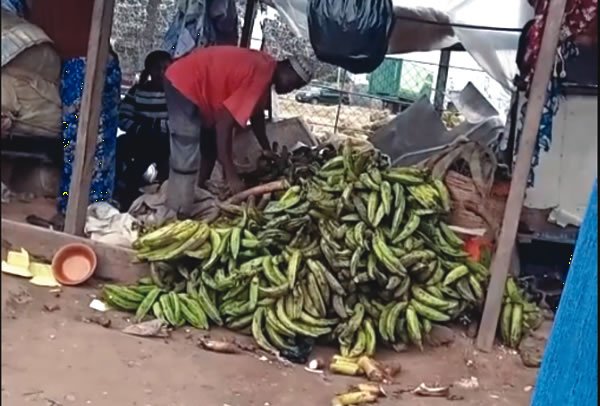For the family of the late Emmanuel Okwuke, banana and plantain have become forbidden fruits. No member of the family dares bring them home. This was after Emmanuel’s life was cut short after he consumed a bunch of his favourite fruit, banana, which he bought on the way home.
The former Information and Communications Technology Editor of Daily Independent Newspapers first battled a damaged liver before giving up the ghost on December 24, 2016.
Two years after the incident, his widow, Juli, said their life had been changed forever by the incident.
Recalling how it all started, she said, “In March 2016, he went for an event on Victoria Island and on his way back, he bought the banana at the Ketu market. My husband did not like late hour food and he always told me not to prepare food for him when it was late. So, even the food they gave him at the event, he did not taste it. He brought everything home.
“He started eating the banana inside the BRT bus en route to the house. On getting home around 12am, I was inside the room when my mother, who had come to stay with us, woke me up to say my husband had been going to the bathroom since he returned from work.
“I rushed there and he told me since he ate the banana he bought at the market, his stomach had been troubling him. He said he was in the office all day without feeling anything, until he took the fruit. He was also vomiting blood.”
She said he was admitted to a general hospital for four days and later transferred to the Lagos State University Teaching Hospital, Ikeja, for tests.
The widow said it was there the fruit he took last was examined and it was discovered calcium carbide was used in the ripening.
She noted that after some treatment, her husband was fine until he relapsed in July of the same year and was in and out of hospitals until he died on the eve of Christmas.
His liver was said to have been damaged.
Emmanuel was survived by his wife and three girls; Treasure (12), Sharon (9) and Delightsome (3).
Our correspondent, during a visit to the family house on Unity Estate, Igbogbo, Ikorodu, a community in the outskirts of Lagos, sighted the late journalist’s unmarked grave.
Delightsome, the couple’s last child together, was all over this correspondent, as she fondly called him ‘Daddy.’
The mother said the three-year-old called every male visitor to the house, ‘daddy,’ because she had a faint idea of her father.
Juli said banana had become a forbidden fruit in the family.
“Before now, my husband bought bananas, plantains and all kinds of fruit in the house, which we all ate. And that particular Ketu was where he bought the fruit. We had a fridge reserved for fruits.
“But now, everything has changed. I would rather plant fruits in my yard than buy outside. Even my second daughter usually says, ‘Mummy, I cannot buy banana outside. It was banana that killed my daddy.’ Even the last child, you cannot buy banana and give her; she will not collect it. If I am not at home and any visitor brings banana as a gift, none of my children would take it,” she added.
While fighting back tears, Juli said since her husband’s death, things had been hard for the family.
She said her dreams had been shattered by her husband’s most loved fruit.
“When I pass by and see where plantains and bananas are sold, I point at it and say, ‘See what killed my husband,’” she added.
Calcium carbide, a poisonous chemical used in artificial fruit ripening, may be one of the silent, under-reported killers in Nigeria.
The National Agency for Food and Drug Administration and Control says consumption of fruits ripened with carbide can lead to several diseases, including cancer.
Calcium carbide contains impurities such as arsenic, lead particles, phosphorus, which pose serious health hazards, can also cause heart, kidney and liver failures, NAFDAC had warned.
It said acetylene produced by calcium carbide affects the neurological system and reduces oxygen supply to the brain, which induces prolonged hypoxia.
Experts say because consumption of fruits ripened with carbide usually cause secondary diseases which are slow to manifest, it is often times difficult to get an official statistics of deaths linked to carbide.
NAFDAC began a sensitisation programme earlier in the year to educate traders on the dangers of using carbide to ripen fruits.
However, findings from field and laboratory investigations by our correspondent showed that not only is the substance still in use in some public markets, not many traders cared about its effect on the health of their customers.
Worse still, many Nigerians are unaware of its use and the danger it poses to their wellbeing.
Although NAFDAC says it is criminal to ripen fruit with it, not a single person has either been arrested or prosecuted by the government agency.
PUNCH























